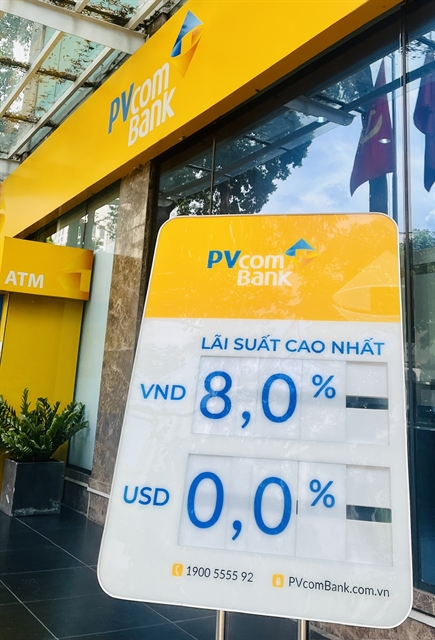Four State-owned banks have further cut deposit interest rates by 0.2-0.3 percentage points to reach around 7 per cent for 12-month deposits.

Four State-owned banks have further cut deposit interest rates by 0.2-0.3 percentage points to reach around 7 per cent for 12-month deposits.
Agribank, BIDV, Vietcombank, and Vietinbank continue to pay the lowest rates in the market, around 6 per cent for six to less than 12 months and around 7 per cent for 12 months.
Meanwhile, larger private banks have cut their 12-month rates to below 8 per cent.
MB, SHB, Techcombank, ACB, VBBank and TPBank pay between 7.3 per cent and 7.9 per cent for 12 months.
Smaller banks have also cut deposit interest rates significantly since last month.
For 12 months deposits, National Citizen Bank’s (NCB) rate has fallen to 7.8 per cent from 7.9 per cent; Kienlong Bank to 8 per cent from 8.2 per cent; and Saigon Bank to 7.8 per cent from 8 per cent.
Deposit interest rates have been plummeting, especially after the central bank cut the operating interest rate in March and April.
At the end of 2022, almost all private banks offered more than 9 per cent for 12-month deposits.
Smaller banks even paid more than 10 per cent.
The high deposit interest rates pushed up lending rates to 13-14 per cent, putting huge pressure on enterprises.
According to VNDirect Securities Company, deposit interest rates will keep falling until the end of 2023, tracking sluggish credit demand due to an economic recession and the sluggish real estate market.
Lending rates remain high

While deposit interest rates keep falling, most firms are complaining high loan interest rates of more than 10 per cent are causing difficulties for them to maintain operations.
The State Bank of Viet Nam (SBV) has attributed the high rates to high inflation and potentially increasing non-performing debt in the coming time.
Speaking at a recent meeting, Nguyen Thi Hong, SBV’s governor, said Viet Nam has a high level of economic openness, so that domestic interest and exchange rates are hugely affected by global financial and monetary changes.
Interest rates globally were high last year and earlier this year as central banks around the world continued to tighten monetary policies, making it more challenging for Viet Nam’s central bank to cut the rates.
While the yearly inflation target was under 4.5 per cent, core inflation in the first four months reached 4.9 per cent.
A circular issued last month allowing lenders to extend loan repayments for businesses facing financial hardships has caused difficulties for banks to ensure they can pay back depositors.
A number of smaller banks have been maintaining deposit interest rates high to attract and retain depositors, contributing to the issue.
According to the central bank, the economy depends on bank loans too much, which has caused interest rates to be too high.
The credit-to-GDP ratio was over 125 per cent last year, the central bank said in a report.
Most banks have been mobilising short-term deposits to give out long-term loans while many borrowers are currently struggling to pay back loans, putting pressure on lending interest rates.
Nearly 90 per cent of the deposits are short-term while more than 50 per cent of credit is mid- to long-term, imposing a risk to the banking system, said the report. — VNS





